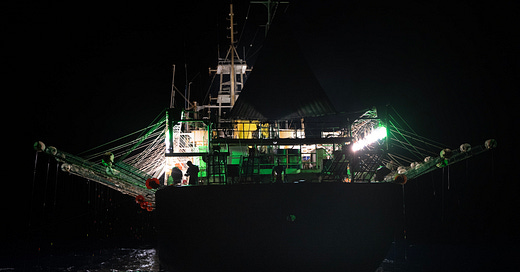Legal Petition to Treasury Department Aims to Limit Imports from Key Seafood Companies Tied to Forced Labor
Shortly after we published our investigation globally, officials from several federal agencies asked if we might consider molding our findings into a formal legal petition under the Global Magnitsky Act. We agreed and recruited help from lawyers at an NGO that has experience crafting such petitions.
Today, that petition was filed to the Department of Treasury. It calls for sanctions against seven Chinese companies that our reporting found to be complicit in serious human rights abuses committed against Xinjiang workers in China’s seafood industry.
The Global Magnitsky Sanctions Program was established to combat worldwide human rights abuses and corruption. It empowers the U.S. government to impose targeted sanctions on individuals or entities involved in severe human rights violations or significant corruption. Abuses committed by the Chinese government against Uyghurs and other Muslim minority groups in Xinjiang are affirmed in the Uyghur Human Rights Policy Act of 2020 as sanctionable offenses. The 2021 Uyghur Forced Labor Prevention Act expanded the sanctionable offenses of the Uyghur Human Rights Policy Act to include, “serious human rights abuses in connection with forced labor.” You can find more information on Glo-Mag sanctions here.
The sanctioning of these companies will serve two key purposes.
First, these actions will continue the United States government’s commitment to addressing the Uyghur genocide currently being perpetrated by China. The United States has attempted to confront this issue through tools like the Global Magnitsky sanctions and laws such as the Uyghur Human Rights Policy Act of 2020. The Chinese government has engaged in a pattern of human rights abuses against the Uyghurs, including arbitrary detention, torture, forced sterilization, and forced labor. Credible reports from the United States government, United Nations (UN), and NGOs show these abuses have been ongoing for several years. In 2021, the United States government declared China’s persecution of Uyghurs and other ethnic minorities in Xinjiang a genocide.
Second, the sanctions will prevent these companies and their associates from selling goods made with Uyghur forced labor to the United States. Sanctioning these seafood processors will reaffirm the United States’ commitment to preventing goods made with Uyghur forced labor from entering the country. The loss of revenue for the perpetrators will also pressure Chinese companies to stop using Uyghur forced labor.
The seven companies cited in the petition are:
Yantai Sanko Fisheries (bait-to-plate, discussion); Yantai Longwin Foods (bait-to-plate, discussion); The Chishan Group, including Shandong Haidu (bait-to-plate, discussion) and Rongcheng Haibo (bait-to-plate, discussion); Shandong Meijia Group, including Rizhao Meijia Aquatic Foodstuff (bait-to-plate, discussion), Rizhao Jiayuan Foodstuff (bait-to-plate, discussion), and Rizhao Meijia Keyuan Foods (bait-to-plate, discussion); Qingdao Tianyuan Aquatic Foodstuffs (bait-to-plate, discussion); Rongsense Group, including Rizhao Rirong Aquatic Products (bait-to-plate, discussion) and Rizhao Rongxing (bait-to-plate, discussion); and Xinjiang Zhongtai Zhihui Modern Service (discussion).
The sanctions recommendation comes on the heels of a similar petition submitted in Canada on December 6, 2023, by the Uyghur Rights Advocacy Project and the Human Rights Action Group, two human rights advocacy organizations. They filed that submission to Global Affairs Canada, requesting that the Canadian government implement sanctions against the same seven Chinese companies. Reporting on this submission can be found here and here.
These sanction recommendations also follow multiple legal actions taken to hold accountable entities identified in the Outlaw Ocean Project’s reporting. By November 2023, two legal petitions were filed with the U.S. Customs and Border Protection (CBP), calling on the agency to issue Withhold Release Orders (WROs) to stop all squid from entering the country tied to Chinese distant water fishing vessels identified in an investigation conducted by The Outlaw Ocean Project. Reporting on these petitions can be found here and here
A growing number of lawmakers in the U.S. are calling attention to seafood imports from China and the need to re-examine this supply chain. This includes calls for enhancing the screening of seafood coming from China; for expanded import monitoring to include all seafood coming into the country; and for bans on imports from two Chinese provinces identified in the investigation as hubs of forced Uyghur and North Korean labor in seafood processing plants. U.S. lawmakers have sent official letters to Sysco and Costco inquiring how these companies will ensure that future audits will adequately prevent seafood tied to Xinjiang and North Korean forced labor from entering the United States. A bipartisan commission created by the White House and Congress held a hearing in October 2023 to discuss the presence of seafood made with forced labor on Chinese ships and in China’s processing factories throughout the U.S. supply chain.
To track these and other developments tied to our investigation please check the Impact page on our website.


